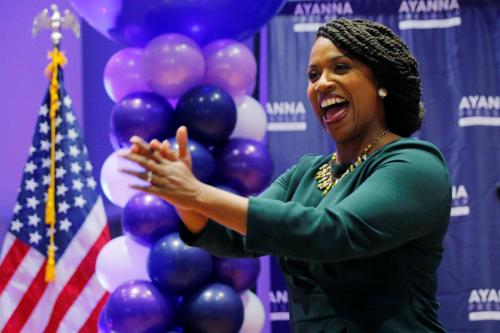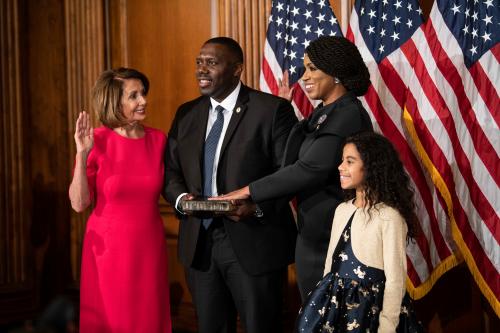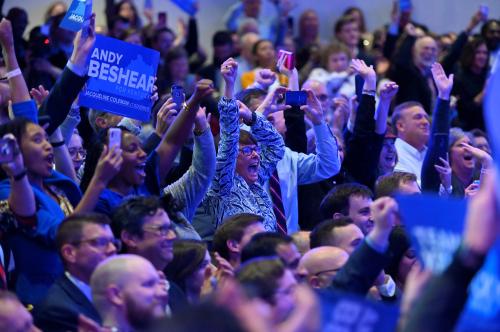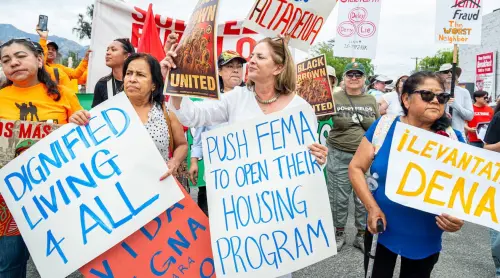The Democratic primary for president has a new frontrunner. At last glance, polls in Iowa saw Mayor Pete Buttigieg surging ahead of previous favorites Sen. Elizabeth Warren, Vice President Joe Biden, and Sen. Bernie Sanders. Observers seem focused on this Iowa bounce—understandable, given that’s where the first primary votes will be cast—but many are tracking the state as if contestants carry their result into the next.
There is a belief, which is more of a myth, that early wins in the primary cycle create momentum that propels voter support for the winning candidates in succeeding states. But there is another, more vital primary not in any single state, but across all of them: the race for Black voters.
Over the last month, Quinnipiac has shown Buttigieg polling in double digits nationwide but at only 4% with Black voters, while Biden has a healthy lead with the Black electorate and a massive lead overall. In Iowa, Buttigieg polls near or at the top. But only about 3% of Iowa’s population is Black, so Biden’s advantage among that electorate is less pronounced there. In South Carolina (where close to 30% of the population is Black), Biden holds a commanding lead, while Buttigieg polls in the single digits with negligible support among prospective Black voters.

If Buttigieg wins Iowa but flops with Black voters in South Carolina, then he will have a difficult time winning a national election as a Democrat. Likewise, if Donald Trump overperforms among Black voters, it will be incredibly hard for Republicans to lose. Candidates increase their chances of winning the presidency by taking the long-range approach of energizing Black voters in the country’s rapidly growing Black-majority cities—especially in swing states—rather than simply winning big early.
Both parties should not discount the powerful recent election results in which Black votes determined the outcome. Just a few weeks ago, Democratic Louisiana Gov. John Bel Edwards successfully fended off his Republican challenger in a runoff election, thanks to heightened turnouts in urban centers in New Orleans and Baton Rouge— two of the largest Black-majority cities in the country. But Edwards could have avoided a runoff altogether if there was an earlier, bigger investment in those Black centers, an unfortunately common oversight among candidates for statewide and federal office.
Both parties should not discount the powerful recent election results in which Black votes determined the outcome.
Similarly, in the 2017 special election for one of Alabama’s U.S. Senate seats, Democrat Doug Jones won in large part from overwhelming support of Black voters, specifically Black women. Ninety-six percent of Black voters and 98% of Black women in that election chose Jones. Had his opponent, Roy Moore, garnered even moderate success with this bloc—which accounts for roughly 30% of the Alabama electorate—Jones would not have succeeded. In the 2018 midterm elections, too, Black voters—especially women—swung elections to Democrats across the country.
“There are plenty of people who applauded Black women for the success for the 2018 election,” said presidential candidate Sen. Kamala Harris during last week’s Democratic debate. “But at some point, folks get tired of just saying ‘Thank me for showing up.’ And say, ‘Well, show up for me.’”
Harris is right: Black voters should not be an afterthought. That’s because momentum among Black voters is a better indicator of success than winning in Iowa or other early primary states.
The importance of Black voters to Democratic primary candidates has been clear for decades, particularly in areas where Black residents form a majority. In 1976, Jimmy Carter won the Democratic nomination (and ultimately the presidency) due in part to strong support from Black voters, particularly in the South. In 1980, Carter faced a strong primary challenge from Ted Kennedy, who decided to forego a pursuit of the Southern states to focus on the industrial Midwest and Northeast. And while Kennedy was ultimately the preferred choice of Black voters by a slim margin nationwide, Carter’s winning coalition included the overwhelming majority of Black voters throughout the South, where most Black-majority cities are located.
The importance of Black voters to Democratic primary candidates has been clear for decades, particularly in areas where Black residents form a majority.
In the 1988 Democratic primaries, Black southerners’ support for Jesse Jackson led to a sweep of the Deep South and made him the runner-up behind eventual nominee Michael Dukakis. In 1992, Bill Clinton received roughly 80% of the vote from Black southerners, vaulting him into the nomination. And in 2008, Barack Obama was able to build a broad base that included overwhelming support from Black voters, allowing him to carry the Southern states on the way to the nomination.
But lately, Democrats may be losing their focus in attracting and energizing Black voters. When Donald Trump won the presidency, Democrats ramped up efforts to appeal to more of the white working-class voters who voted Republican in 2016. Economic hardship was supposed to have been the reason these voters aligned themselves with Trump. Yet Gallup research showed that Americans with a favorable opinion of Trump are “slightly more likely to be employed and no more likely to be out of the labor force than those who see him unfavorably.” Meaning that Democrats were (and still are) chasing the wrong bloc.
“There’s always been something problematic about the Democratic Party’s fixation on white working-class voters,” wrote political commentator Sally Kohn for The Daily Beast. “[W]hile the entire rest of the marketing and outreach universe has moved toward niche markets…the Democratic Party continues to treat its black base like an afterthought, or worse, an inconvenience.”
Democrats in 2020 face an existential crisis about whether white working-class voters should be at the center of the party. They would do well to remember lessons of the past, and compete in the most important primary of them all—the one for Black voters.
Allison Hardebeck contributed great research assistance for this post.
The Brookings Institution is committed to quality, independence, and impact.
We are supported by a diverse array of funders. In line with our values and policies, each Brookings publication represents the sole views of its author(s).








Commentary
Why the race for Black voters is the most important Democratic primary of them all
November 25, 2019